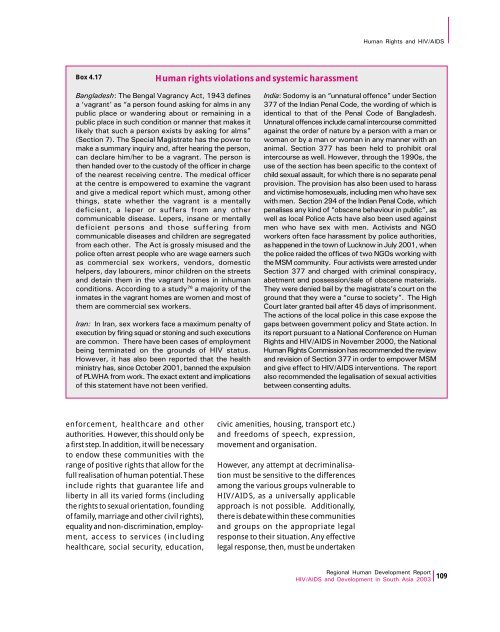Download Report - UNDP Asia-Pacific Regional Centre - United ...
Download Report - UNDP Asia-Pacific Regional Centre - United ...
Download Report - UNDP Asia-Pacific Regional Centre - United ...
Create successful ePaper yourself
Turn your PDF publications into a flip-book with our unique Google optimized e-Paper software.
Human Rights and HIV/AIDSBox 4.17Human rights violations and systemic harassmentBangladesh: The Bengal Vagrancy Act, 1943 definesa ‘vagrant’ as “a person found asking for alms in anypublic place or wandering about or remaining in apublic place in such condition or manner that makes itlikely that such a person exists by asking for alms”(Section 7). The Special Magistrate has the power tomake a summary inquiry and, after hearing the person,can declare him/her to be a vagrant. The person isthen handed over to the custody of the officer in chargeof the nearest receiving centre. The medical officerat the centre is empowered to examine the vagrantand give a medical report which must, among otherthings, state whether the vagrant is a mentallydeficient, a leper or suffers from any othercommunicable disease. Lepers, insane or mentallydeficient persons and those suffering fromcommunicable diseases and children are segregatedfrom each other. The Act is grossly misused and thepolice often arrest people who are wage earners suchas commercial sex workers, vendors, domestichelpers, day labourers, minor children on the streetsand detain them in the vagrant homes in inhumanconditions. According to a study 76 a majority of theinmates in the vagrant homes are women and most ofthem are commercial sex workers.Iran: In Iran, sex workers face a maximum penalty ofexecution by firing squad or stoning and such executionsare common. There have been cases of employmentbeing terminated on the grounds of HIV status.However, it has also been reported that the healthministry has, since October 2001, banned the expulsionof PLWHA from work. The exact extent and implicationsof this statement have not been verified.India: Sodomy is an “unnatural offence” under Section377 of the Indian Penal Code, the wording of which isidentical to that of the Penal Code of Bangladesh.Unnatural offences include carnal intercourse committedagainst the order of nature by a person with a man orwoman or by a man or woman in any manner with ananimal. Section 377 has been held to prohibit oralintercourse as well. However, through the 1990s, theuse of the section has been specific to the context ofchild sexual assault, for which there is no separate penalprovision. The provision has also been used to harassand victimise homosexuals, including men who have sexwith men. Section 294 of the Indian Penal Code, whichpenalises any kind of “obscene behaviour in public”, aswell as local Police Acts have also been used againstmen who have sex with men. Activists and NGOworkers often face harassment by police authorities,as happened in the town of Lucknow in July 2001, whenthe police raided the offices of two NGOs working withthe MSM community. our activists were arrested underSection 377 and charged with criminal conspiracy,abetment and possession/sale of obscene materials.They were denied bail by the magistrate’s court on theground that they were a “curse to society”. The HighCourt later granted bail after 45 days of imprisonment.The actions of the local police in this case expose thegaps between government policy and State action. Inits report pursuant to a National Conference on HumanRights and HIV/AIDS in November 2000, the NationalHuman Rights Commission has recommended the reviewand revision of Section 377 in order to empower MSMand give effect to HIV/AIDS interventions. The reportalso recommended the legalisation of sexual activitiesbetween consenting adults.enforcement, healthcare and otherauthorities. However, this should only bea first step. In addition, it will be necessaryto endow these communities with therange of positive rights that allow for thefull realisation of human potential. Theseinclude rights that guarantee life andliberty in all its varied forms (includingthe rights to sexual orientation, foundingof family, marriage and other civil rights),equality and non-discrimination, employment,access to services (includinghealthcare, social security, education,civic amenities, housing, transport etc.)and freedoms of speech, expression,movement and organisation.However, any attempt at decriminalisationmust be sensitive to the differencesamong the various groups vulnerable toHIV/AIDS, as a universally applicableapproach is not possible. Additionally,there is debate within these communitiesand groups on the appropriate legalresponse to their situation. Any effectivelegal response, then, must be undertaken<strong>Regional</strong> Human Development <strong>Report</strong>HIV/AIDS and Development in South <strong>Asia</strong> 2003 109
















